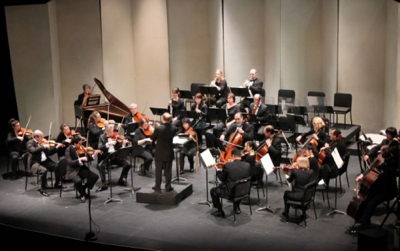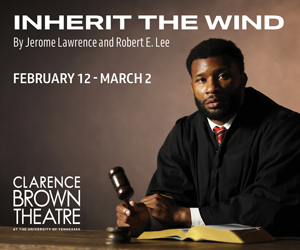Knoxville Symphony Chamber Orchestra
Works by Richard Strauss, William Schuman, and Johannes Brahms
Bijou Theatre—Sunday, May 3, 2:30 p.m.
Tickets start at $15
http://www.knoxvillesymphony.com

This Sunday afternoon’s Chamber Classics Series concert by the Knoxville Symphony Chamber Orchestra will be something of a commencement of sorts. It will be the final one of the season for the Chamber Orchestra and the final one under the music directorship and baton of Lucas Richman. However, keep in mind that the definition of commencement is a beginning, not a conclusion. While the emotion of such an occasion always extends way beyond the specifics and scope of the music offered, the selections do seem to lead in a definite direction—that of a beginning.
There are several programming factors at play in the three works—Richard Strauss’ Serenade in E-flat Major, Op. 7; William Schuman’s Symphony for Strings (Symphony No. 5); and Brahms Serenade No. 1 in D Major, Op. 11. The Strauss is a work just for winds, the Schuman is a work just for strings, and the Brahms is a work for both—giving an ensemble showcase opportunity to the KSO players. More importantly, each work was early, or relatively early, in each composer’s career and suggested the possibilities of things to come. And, perhaps, most importantly, these are works that exemplify what chamber orchestra concerts should be about.
Richard Strauss’ Serenade in E-flat Major was completed when the composer was just 17 years old and premiered a year later in 1882. Strauss’ youth was one surrounded with music, his father being the principal horn with the Munich court orchestra. Clearly, the paternal horn influence was a strong one on young Strauss, as were his father’s stylistic preferences for classical period and early Romantic period music. The work’s sonority unsurprisingly tilts somewhat toward the horns, but is skillfully balanced between the two flutes, two oboes, two clarinets, two bassoons, four horns, and contrabassoon. The work is in a single movement—a movement as lovingly melodic and gentle as the air on a summer night.
William Schuman (1910–1992) was an American composer whose career also touched teaching and arts administration work, at one time being the president of the Juilliard School and the first president of Lincoln Center. He was born in New York City and originally entered college in business administration. At age 20, after attending a Carnegie Hall concert with his sister, he is reported to have said: “I was astounded at seeing the sea of stringed instruments, and everybody bowing together. The visual thing alone was astonishing. But the sound! I was overwhelmed. I had never heard anything like it. The very next day, I decided to become a composer.”
Schuman’s Symphony for Strings, composed at the age of 33, was commissioned by the Koussevitzky Foundation and first performed on November 12, 1943, with Serge Koussevitsky conducting the Boston Symphony Orchestra. That same year, Schuman was awarded the first ever Pulitzer Prize in Music for his Secular Cantata No. 2: A Free Song.
As early as the age of 20, Johannes Brahms was already being referred to as one of the next great composers. A 25 year old Brahms premiered his Serenade No. 1 in D Major in 1859, the first of two serenades that Brahms wrote in the time period which also saw the birth of his Piano Concerto No. 1. The work is in six movements and is scored for a typical chamber orchestra.
In conclusion, what must also recommend this concert is the realization that, despite the KSO’s 75-plus year history, it has most assuredly come of age during the tenure of Maestro Richman. His legacy will indeed be the attention to detail of orchestral quality and his willingness to make hard decisions for the sake of the orchestra and its future. So, on Sunday, come for the music and to thank Richman for a job well done.






